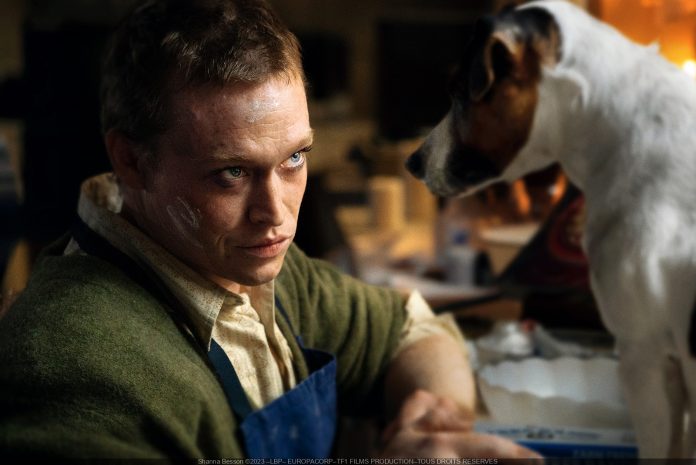Luc Besson’s latest film, Dogman, is an emotionally shattering, sensitive, insightful, painful, messy, and soul-saving film that marks the year 2023. The scale of Dogman is reminiscent of Victor Hugo’s multi-volume novel Les Miserables, not to be outdone by Tom Huper’s 2012 cinematic musical Les Miserables; though Dogman is not a musical, it does have music, even if it is not in 19th-century France, and it does have Romanticism. The film is heart-rending, but without exaggerated pathos; it cuts the right in the feels.
Luc Besson is known for his action films, such as The Fifth Element (1997), Leon (1994), Lucy (2014), which have a sensitive string to them, i.e. they don’t just have guns and bad guys, but also have sensitive relationships between people, colorful, often traumatized inner worlds of their characters, and the fact that it is not only lives that are at stake, but also real emotions. Besson continues this tradition in his latest film.

The word “painful” sounds too modest to describe the story of Dogman. “Tragic” would be more appropriate. Tragic not from the negative connotation of poor quality, but from the Greek drama genre, where the key was to evoke strong feelings for the viewers, so that they would be struck by a catharsis; a whirlpool of emotions following with relief.
This is achieved by the good fighting against the evil and ultimately by the good being defeated. But tragedy is even more powerful when the pure, innocent soul is subjected to great calamities, great sorrows, and evils, which do not adversely affect the willpower emanating from them. It is this inner “light” that the protagonist of Dogman, Douglas (Caleb Landry Jones), gives off despite all the hardships.

As a boy, he grows up with an abusive father and a submissive, weak-willed mother who is unable to resist her husband’s despotism. His older brother, influenced by his upbringing at home, turns mad. He takes his father’s side and adopts his cruelty. Only Douglas feels compassion and love. He looks for compassion and love where he can find it, among the dogs his father raises for the fighting ring.
The dogs show the boy more tenderness than his father, even when the latter throws his son into a doghouse and leaves him there, in winter and summer, for at least a few years, judging by the length of Douglas’ hair. Finally, before he regains his freedom, the boy is left unable to walk due to his father’s fists. Yet, his life is forever tied to dogs: he grows up to be a Dogman — a dog rescuer, caretaker, and animal whisperer.

The love for dogs and a developing interest in dressing up as beautiful women were the defining characteristics of Douglas, which shaped his fate. Later in life, he did not always make moral choices, but he always had that inner “light”, the mark of a good person.
Surprisingly, he kept his faith in God. He understood that God is sometimes a cruel father, but his hand can also be merciful. The faith axis runs through the whole film and can be said to explain why the oppressed man did not grow up to be an abuser himself. Douglas is constantly tormented by his heartbreak – a heartbreak that is hidden in his soft smile. Perhaps if he had pushed it into the darkest corners of his heart, other far more difficult feelings would have taken its place. On the same subject there are allusions to religion in the film; suffering is linked to the cross. It is suggested that those who do not turn away from suffering are saved. Saved from the black soul of the world.

Religion isn’t pushed in the film as much. Besson does not go through any propaganda. In fact, the type of religion is not emphasized very much either; God is called God, not Jesus, Allah, or Yahweh. The theme of spirituality gives this film depth, meaning and different shades. The meaning of human existence is always unsettling.
The film in some ways is reminiscent of superhero stories, albeit not in a very obvious manner. Douglas is nicknamed Dogman by the community (like Spider-Man, Superman), he even has a superpower and saves the weak. Like all heroes, he was wronged as a child, but remained good and noble. Considering what we said before about the religious motifs in the film, the combination of religion and heroism is quite interesting as if trying to balance the archaic and modern archetypes.
It is a great film; not drawn out, not tiresome, not exaggerated, but believable, influential and, above all, meaningful and sensitive. At times, when most people go to the cinema expecting entertainment that will turn their minds to mush, films like Dogman are a pleasant surprise and help (not forcefully) to shed real tears that will cleanse us of the everyday filth.




